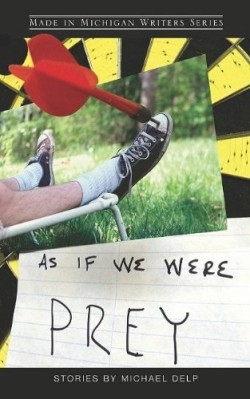As If We Were Prey
- 2010 INDIES Winner
- Bronze, Short Stories (Adult Fiction)
As If We Were Prey is part of Wayne State University’s “Made in Michigan” book series, of which Michael Delp is a co-editor. It’s a small book in stature, comprising eight short stories in 120 pages, but communicates a larger scope. Delp brings to the page a high capacity for complexity and understanding—especially of men in curious situations.
In the opening story, “Commandos,” the narrator keeps an eye on the bully next door through binoculars. We soon find these binoculars to be the metaphor for observing the lives around us—that is, narrow and confining. In the shocking ending, the binoculars reveal the consequences of misunderstanding. It’s the kind of story that sticks in the mind long after reading.
In “Traveling Einstein,” Art Bewley is a traveling answer man, a so-called Master of Minutiae. He takes on all questions from anyone and offers money in return for a wrong answer. But Bewley never has to pay his audience until he meets a woman on one of his stops who asks him a question: “What’s the difference between what a man desires and what a woman desires?” Bewley is stumped. When she gives him the answer, he knows he is in love.
Delp writes in a simple and easy style. But that’s not to say his stories are simple, and that’s the great trick of As If We Were Prey. All of the men he writes about are flawed in some way and how they forge their way through life is at the crux of the collection. Some of the stories, such as “We Are Living in the Future,” remind us of the mistakes we made in the past. In “Mystery Park,” Ray Munger and a waitress he meets decide to release a performing bear from captivity. Of course we’re rooting for them.
While there are deadly serious consequences to some of these stories, the light and humorous style imbues his characters with a likeability not found in story collections that have a much greater ambition. That’s a good trick if you can pull it off, and Delp does with aplomb.
In the final title story, “ Prey,“ Delp also shows the deadliness in a life lived by habit. Vietnam veteran George Houck has taught high school for thirty-three years; his life has become so predictable that it is beyond painful. And yet even in the astonishing conclusion, Delp helps us understand how not only this man, but all the men in the collection, can be driven to one final, demonstrative moment.
In his previous four books, Delp has written of water, fishing, and wildness in poetry and lyrical prose. Perhaps this lyrical compression is what helps him to accomplish so much in such a short span.
Disclosure: This article is not an endorsement, but a review. The publisher of this book provided free copies of the book to have their book reviewed by a professional reviewer. No fee was paid by the publisher for this review. Foreword Reviews only recommends books that we love. Foreword Magazine, Inc. is disclosing this in accordance with the Federal Trade Commission’s 16 CFR, Part 255.

